Analyze and Summarize Journal Articles
VerifiedAdded on 2020/09/03
|16
|4961
|86
AI Summary
The provided assignment involves analyzing multiple journal articles across various disciplines, extracting relevant information, and summarizing the content in a JSON object. The student is required to find a suitable assignment title, generate a meta title with the prefix [SOLVED], create a meta description for SEO, and provide a summary of the assignment. The assignment includes a list of references and online resources to be used.
Contribute Materials
Your contribution can guide someone’s learning journey. Share your
documents today.
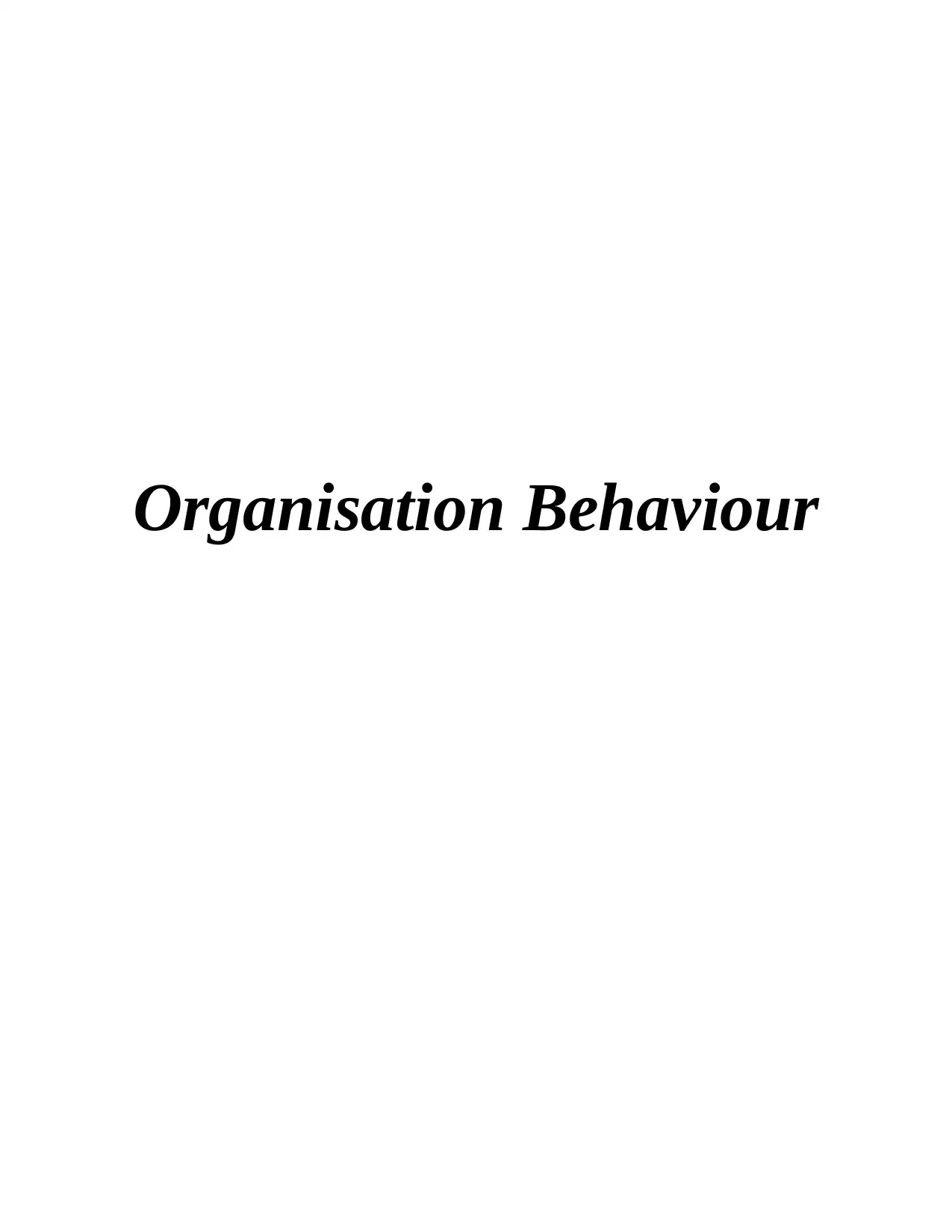
Organisation Behaviour
Secure Best Marks with AI Grader
Need help grading? Try our AI Grader for instant feedback on your assignments.
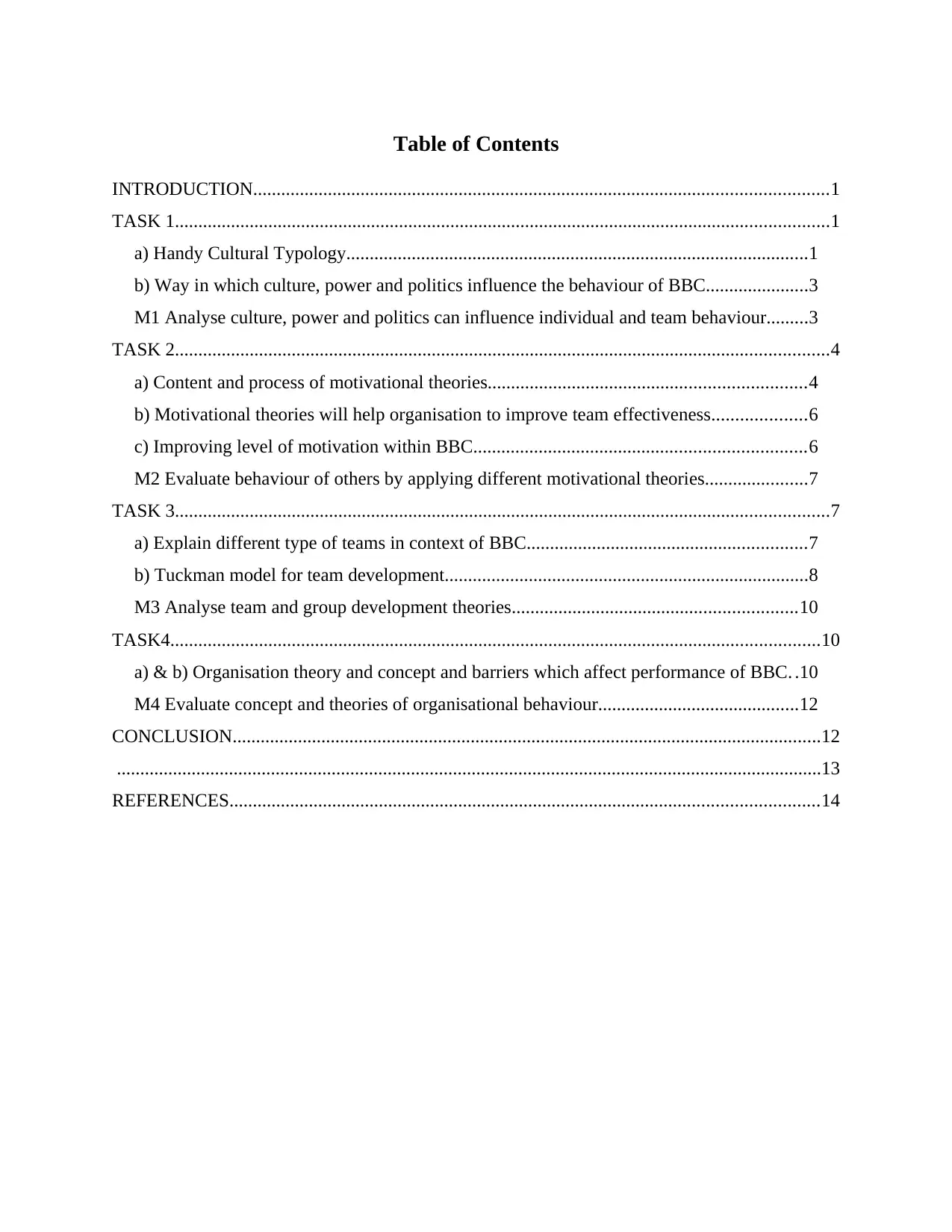
Table of Contents
INTRODUCTION...........................................................................................................................1
TASK 1............................................................................................................................................1
a) Handy Cultural Typology...................................................................................................1
b) Way in which culture, power and politics influence the behaviour of BBC......................3
M1 Analyse culture, power and politics can influence individual and team behaviour.........3
TASK 2............................................................................................................................................4
a) Content and process of motivational theories....................................................................4
b) Motivational theories will help organisation to improve team effectiveness....................6
c) Improving level of motivation within BBC.......................................................................6
M2 Evaluate behaviour of others by applying different motivational theories......................7
TASK 3............................................................................................................................................7
a) Explain different type of teams in context of BBC............................................................7
b) Tuckman model for team development..............................................................................8
M3 Analyse team and group development theories.............................................................10
TASK4...........................................................................................................................................10
a) & b) Organisation theory and concept and barriers which affect performance of BBC. .10
M4 Evaluate concept and theories of organisational behaviour...........................................12
CONCLUSION..............................................................................................................................12
.......................................................................................................................................................13
REFERENCES..............................................................................................................................14
INTRODUCTION...........................................................................................................................1
TASK 1............................................................................................................................................1
a) Handy Cultural Typology...................................................................................................1
b) Way in which culture, power and politics influence the behaviour of BBC......................3
M1 Analyse culture, power and politics can influence individual and team behaviour.........3
TASK 2............................................................................................................................................4
a) Content and process of motivational theories....................................................................4
b) Motivational theories will help organisation to improve team effectiveness....................6
c) Improving level of motivation within BBC.......................................................................6
M2 Evaluate behaviour of others by applying different motivational theories......................7
TASK 3............................................................................................................................................7
a) Explain different type of teams in context of BBC............................................................7
b) Tuckman model for team development..............................................................................8
M3 Analyse team and group development theories.............................................................10
TASK4...........................................................................................................................................10
a) & b) Organisation theory and concept and barriers which affect performance of BBC. .10
M4 Evaluate concept and theories of organisational behaviour...........................................12
CONCLUSION..............................................................................................................................12
.......................................................................................................................................................13
REFERENCES..............................................................................................................................14
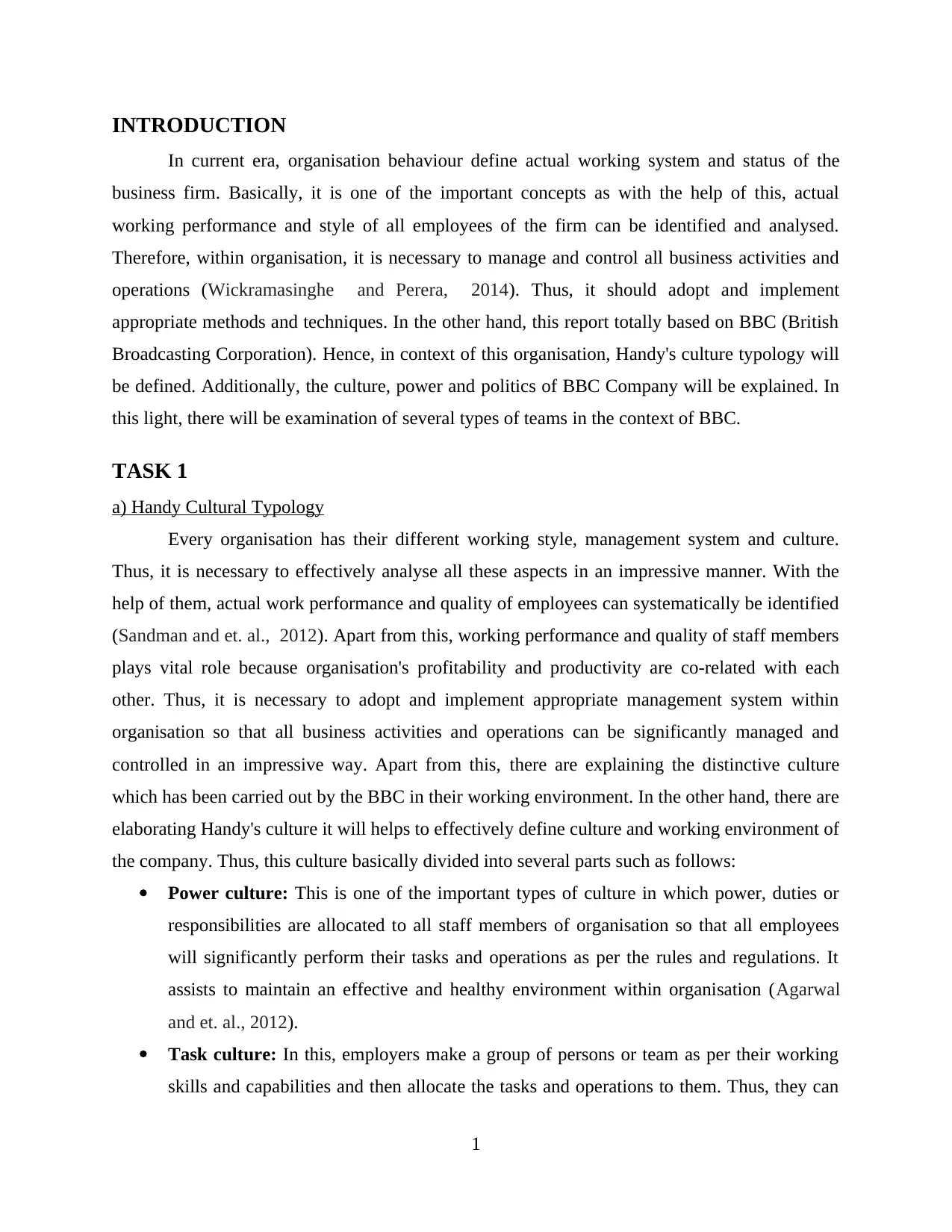
INTRODUCTION
In current era, organisation behaviour define actual working system and status of the
business firm. Basically, it is one of the important concepts as with the help of this, actual
working performance and style of all employees of the firm can be identified and analysed.
Therefore, within organisation, it is necessary to manage and control all business activities and
operations (Wickramasinghe and Perera, 2014). Thus, it should adopt and implement
appropriate methods and techniques. In the other hand, this report totally based on BBC (British
Broadcasting Corporation). Hence, in context of this organisation, Handy's culture typology will
be defined. Additionally, the culture, power and politics of BBC Company will be explained. In
this light, there will be examination of several types of teams in the context of BBC.
TASK 1
a) Handy Cultural Typology
Every organisation has their different working style, management system and culture.
Thus, it is necessary to effectively analyse all these aspects in an impressive manner. With the
help of them, actual work performance and quality of employees can systematically be identified
(Sandman and et. al., 2012). Apart from this, working performance and quality of staff members
plays vital role because organisation's profitability and productivity are co-related with each
other. Thus, it is necessary to adopt and implement appropriate management system within
organisation so that all business activities and operations can be significantly managed and
controlled in an impressive way. Apart from this, there are explaining the distinctive culture
which has been carried out by the BBC in their working environment. In the other hand, there are
elaborating Handy's culture it will helps to effectively define culture and working environment of
the company. Thus, this culture basically divided into several parts such as follows:
Power culture: This is one of the important types of culture in which power, duties or
responsibilities are allocated to all staff members of organisation so that all employees
will significantly perform their tasks and operations as per the rules and regulations. It
assists to maintain an effective and healthy environment within organisation (Agarwal
and et. al., 2012).
Task culture: In this, employers make a group of persons or team as per their working
skills and capabilities and then allocate the tasks and operations to them. Thus, they can
1
In current era, organisation behaviour define actual working system and status of the
business firm. Basically, it is one of the important concepts as with the help of this, actual
working performance and style of all employees of the firm can be identified and analysed.
Therefore, within organisation, it is necessary to manage and control all business activities and
operations (Wickramasinghe and Perera, 2014). Thus, it should adopt and implement
appropriate methods and techniques. In the other hand, this report totally based on BBC (British
Broadcasting Corporation). Hence, in context of this organisation, Handy's culture typology will
be defined. Additionally, the culture, power and politics of BBC Company will be explained. In
this light, there will be examination of several types of teams in the context of BBC.
TASK 1
a) Handy Cultural Typology
Every organisation has their different working style, management system and culture.
Thus, it is necessary to effectively analyse all these aspects in an impressive manner. With the
help of them, actual work performance and quality of employees can systematically be identified
(Sandman and et. al., 2012). Apart from this, working performance and quality of staff members
plays vital role because organisation's profitability and productivity are co-related with each
other. Thus, it is necessary to adopt and implement appropriate management system within
organisation so that all business activities and operations can be significantly managed and
controlled in an impressive way. Apart from this, there are explaining the distinctive culture
which has been carried out by the BBC in their working environment. In the other hand, there are
elaborating Handy's culture it will helps to effectively define culture and working environment of
the company. Thus, this culture basically divided into several parts such as follows:
Power culture: This is one of the important types of culture in which power, duties or
responsibilities are allocated to all staff members of organisation so that all employees
will significantly perform their tasks and operations as per the rules and regulations. It
assists to maintain an effective and healthy environment within organisation (Agarwal
and et. al., 2012).
Task culture: In this, employers make a group of persons or team as per their working
skills and capabilities and then allocate the tasks and operations to them. Thus, they can
1
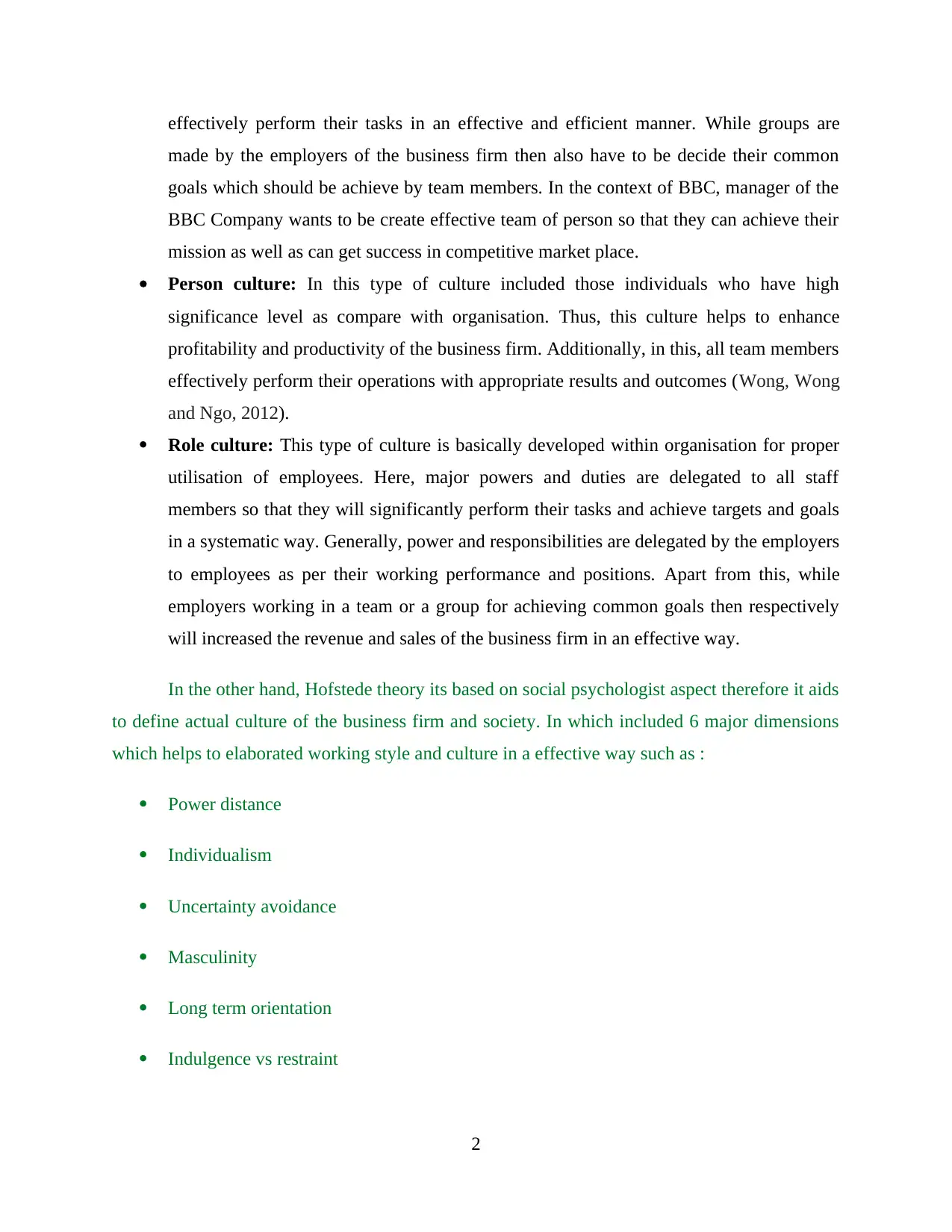
effectively perform their tasks in an effective and efficient manner. While groups are
made by the employers of the business firm then also have to be decide their common
goals which should be achieve by team members. In the context of BBC, manager of the
BBC Company wants to be create effective team of person so that they can achieve their
mission as well as can get success in competitive market place.
Person culture: In this type of culture included those individuals who have high
significance level as compare with organisation. Thus, this culture helps to enhance
profitability and productivity of the business firm. Additionally, in this, all team members
effectively perform their operations with appropriate results and outcomes (Wong, Wong
and Ngo, 2012).
Role culture: This type of culture is basically developed within organisation for proper
utilisation of employees. Here, major powers and duties are delegated to all staff
members so that they will significantly perform their tasks and achieve targets and goals
in a systematic way. Generally, power and responsibilities are delegated by the employers
to employees as per their working performance and positions. Apart from this, while
employers working in a team or a group for achieving common goals then respectively
will increased the revenue and sales of the business firm in an effective way.
In the other hand, Hofstede theory its based on social psychologist aspect therefore it aids
to define actual culture of the business firm and society. In which included 6 major dimensions
which helps to elaborated working style and culture in a effective way such as :
Power distance
Individualism
Uncertainty avoidance
Masculinity
Long term orientation
Indulgence vs restraint
2
made by the employers of the business firm then also have to be decide their common
goals which should be achieve by team members. In the context of BBC, manager of the
BBC Company wants to be create effective team of person so that they can achieve their
mission as well as can get success in competitive market place.
Person culture: In this type of culture included those individuals who have high
significance level as compare with organisation. Thus, this culture helps to enhance
profitability and productivity of the business firm. Additionally, in this, all team members
effectively perform their operations with appropriate results and outcomes (Wong, Wong
and Ngo, 2012).
Role culture: This type of culture is basically developed within organisation for proper
utilisation of employees. Here, major powers and duties are delegated to all staff
members so that they will significantly perform their tasks and achieve targets and goals
in a systematic way. Generally, power and responsibilities are delegated by the employers
to employees as per their working performance and positions. Apart from this, while
employers working in a team or a group for achieving common goals then respectively
will increased the revenue and sales of the business firm in an effective way.
In the other hand, Hofstede theory its based on social psychologist aspect therefore it aids
to define actual culture of the business firm and society. In which included 6 major dimensions
which helps to elaborated working style and culture in a effective way such as :
Power distance
Individualism
Uncertainty avoidance
Masculinity
Long term orientation
Indulgence vs restraint
2
Secure Best Marks with AI Grader
Need help grading? Try our AI Grader for instant feedback on your assignments.
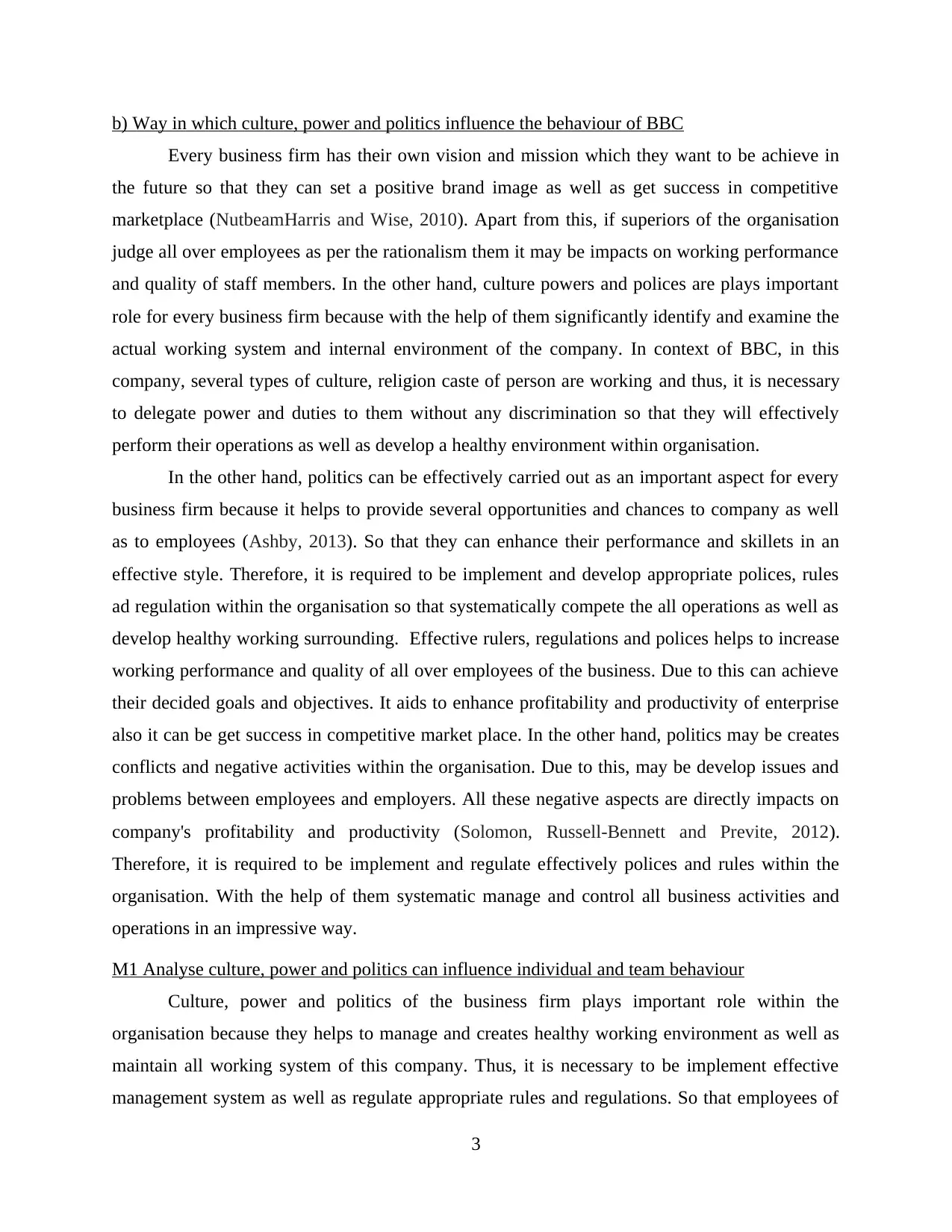
b) Way in which culture, power and politics influence the behaviour of BBC
Every business firm has their own vision and mission which they want to be achieve in
the future so that they can set a positive brand image as well as get success in competitive
marketplace (NutbeamHarris and Wise, 2010). Apart from this, if superiors of the organisation
judge all over employees as per the rationalism them it may be impacts on working performance
and quality of staff members. In the other hand, culture powers and polices are plays important
role for every business firm because with the help of them significantly identify and examine the
actual working system and internal environment of the company. In context of BBC, in this
company, several types of culture, religion caste of person are working and thus, it is necessary
to delegate power and duties to them without any discrimination so that they will effectively
perform their operations as well as develop a healthy environment within organisation.
In the other hand, politics can be effectively carried out as an important aspect for every
business firm because it helps to provide several opportunities and chances to company as well
as to employees (Ashby, 2013). So that they can enhance their performance and skillets in an
effective style. Therefore, it is required to be implement and develop appropriate polices, rules
ad regulation within the organisation so that systematically compete the all operations as well as
develop healthy working surrounding. Effective rulers, regulations and polices helps to increase
working performance and quality of all over employees of the business. Due to this can achieve
their decided goals and objectives. It aids to enhance profitability and productivity of enterprise
also it can be get success in competitive market place. In the other hand, politics may be creates
conflicts and negative activities within the organisation. Due to this, may be develop issues and
problems between employees and employers. All these negative aspects are directly impacts on
company's profitability and productivity (Solomon, Russell-Bennett and Previte, 2012).
Therefore, it is required to be implement and regulate effectively polices and rules within the
organisation. With the help of them systematic manage and control all business activities and
operations in an impressive way.
M1 Analyse culture, power and politics can influence individual and team behaviour
Culture, power and politics of the business firm plays important role within the
organisation because they helps to manage and creates healthy working environment as well as
maintain all working system of this company. Thus, it is necessary to be implement effective
management system as well as regulate appropriate rules and regulations. So that employees of
3
Every business firm has their own vision and mission which they want to be achieve in
the future so that they can set a positive brand image as well as get success in competitive
marketplace (NutbeamHarris and Wise, 2010). Apart from this, if superiors of the organisation
judge all over employees as per the rationalism them it may be impacts on working performance
and quality of staff members. In the other hand, culture powers and polices are plays important
role for every business firm because with the help of them significantly identify and examine the
actual working system and internal environment of the company. In context of BBC, in this
company, several types of culture, religion caste of person are working and thus, it is necessary
to delegate power and duties to them without any discrimination so that they will effectively
perform their operations as well as develop a healthy environment within organisation.
In the other hand, politics can be effectively carried out as an important aspect for every
business firm because it helps to provide several opportunities and chances to company as well
as to employees (Ashby, 2013). So that they can enhance their performance and skillets in an
effective style. Therefore, it is required to be implement and develop appropriate polices, rules
ad regulation within the organisation so that systematically compete the all operations as well as
develop healthy working surrounding. Effective rulers, regulations and polices helps to increase
working performance and quality of all over employees of the business. Due to this can achieve
their decided goals and objectives. It aids to enhance profitability and productivity of enterprise
also it can be get success in competitive market place. In the other hand, politics may be creates
conflicts and negative activities within the organisation. Due to this, may be develop issues and
problems between employees and employers. All these negative aspects are directly impacts on
company's profitability and productivity (Solomon, Russell-Bennett and Previte, 2012).
Therefore, it is required to be implement and regulate effectively polices and rules within the
organisation. With the help of them systematic manage and control all business activities and
operations in an impressive way.
M1 Analyse culture, power and politics can influence individual and team behaviour
Culture, power and politics of the business firm plays important role within the
organisation because they helps to manage and creates healthy working environment as well as
maintain all working system of this company. Thus, it is necessary to be implement effective
management system as well as regulate appropriate rules and regulations. So that employees of
3
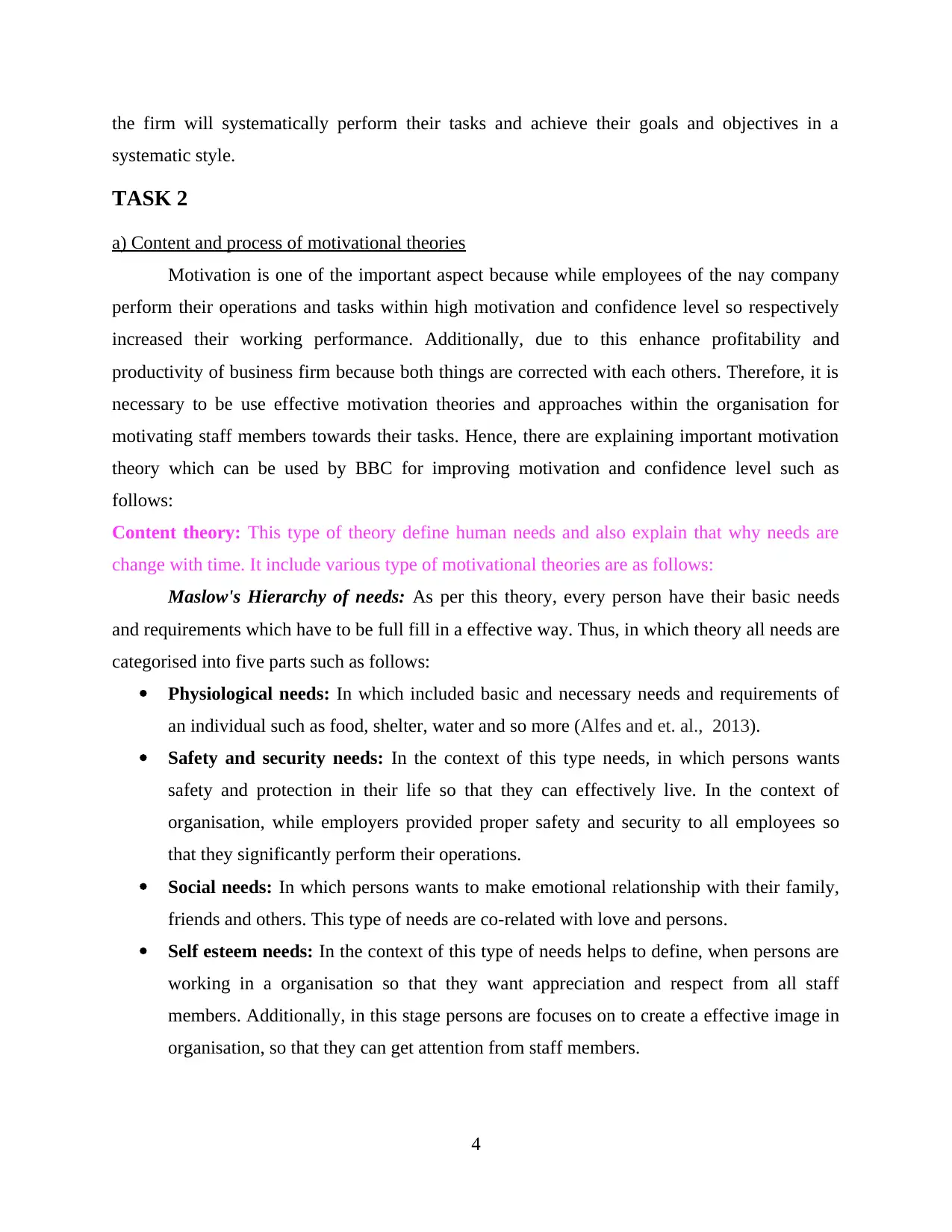
the firm will systematically perform their tasks and achieve their goals and objectives in a
systematic style.
TASK 2
a) Content and process of motivational theories
Motivation is one of the important aspect because while employees of the nay company
perform their operations and tasks within high motivation and confidence level so respectively
increased their working performance. Additionally, due to this enhance profitability and
productivity of business firm because both things are corrected with each others. Therefore, it is
necessary to be use effective motivation theories and approaches within the organisation for
motivating staff members towards their tasks. Hence, there are explaining important motivation
theory which can be used by BBC for improving motivation and confidence level such as
follows:
Content theory: This type of theory define human needs and also explain that why needs are
change with time. It include various type of motivational theories are as follows:
Maslow's Hierarchy of needs: As per this theory, every person have their basic needs
and requirements which have to be full fill in a effective way. Thus, in which theory all needs are
categorised into five parts such as follows:
Physiological needs: In which included basic and necessary needs and requirements of
an individual such as food, shelter, water and so more (Alfes and et. al., 2013).
Safety and security needs: In the context of this type needs, in which persons wants
safety and protection in their life so that they can effectively live. In the context of
organisation, while employers provided proper safety and security to all employees so
that they significantly perform their operations.
Social needs: In which persons wants to make emotional relationship with their family,
friends and others. This type of needs are co-related with love and persons.
Self esteem needs: In the context of this type of needs helps to define, when persons are
working in a organisation so that they want appreciation and respect from all staff
members. Additionally, in this stage persons are focuses on to create a effective image in
organisation, so that they can get attention from staff members.
4
systematic style.
TASK 2
a) Content and process of motivational theories
Motivation is one of the important aspect because while employees of the nay company
perform their operations and tasks within high motivation and confidence level so respectively
increased their working performance. Additionally, due to this enhance profitability and
productivity of business firm because both things are corrected with each others. Therefore, it is
necessary to be use effective motivation theories and approaches within the organisation for
motivating staff members towards their tasks. Hence, there are explaining important motivation
theory which can be used by BBC for improving motivation and confidence level such as
follows:
Content theory: This type of theory define human needs and also explain that why needs are
change with time. It include various type of motivational theories are as follows:
Maslow's Hierarchy of needs: As per this theory, every person have their basic needs
and requirements which have to be full fill in a effective way. Thus, in which theory all needs are
categorised into five parts such as follows:
Physiological needs: In which included basic and necessary needs and requirements of
an individual such as food, shelter, water and so more (Alfes and et. al., 2013).
Safety and security needs: In the context of this type needs, in which persons wants
safety and protection in their life so that they can effectively live. In the context of
organisation, while employers provided proper safety and security to all employees so
that they significantly perform their operations.
Social needs: In which persons wants to make emotional relationship with their family,
friends and others. This type of needs are co-related with love and persons.
Self esteem needs: In the context of this type of needs helps to define, when persons are
working in a organisation so that they want appreciation and respect from all staff
members. Additionally, in this stage persons are focuses on to create a effective image in
organisation, so that they can get attention from staff members.
4
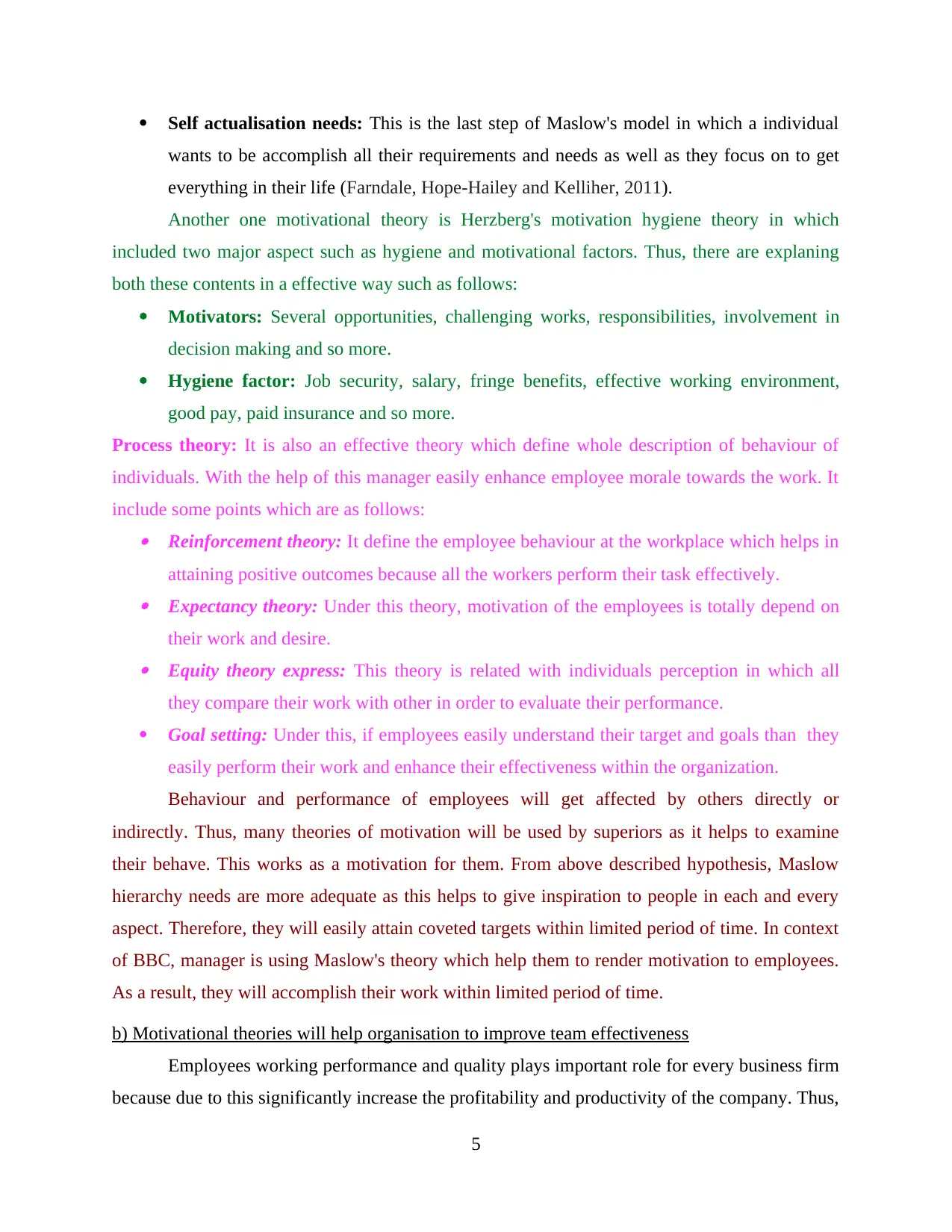
Self actualisation needs: This is the last step of Maslow's model in which a individual
wants to be accomplish all their requirements and needs as well as they focus on to get
everything in their life (Farndale, Hope-Hailey and Kelliher, 2011).
Another one motivational theory is Herzberg's motivation hygiene theory in which
included two major aspect such as hygiene and motivational factors. Thus, there are explaning
both these contents in a effective way such as follows:
Motivators: Several opportunities, challenging works, responsibilities, involvement in
decision making and so more.
Hygiene factor: Job security, salary, fringe benefits, effective working environment,
good pay, paid insurance and so more.
Process theory: It is also an effective theory which define whole description of behaviour of
individuals. With the help of this manager easily enhance employee morale towards the work. It
include some points which are as follows: Reinforcement theory: It define the employee behaviour at the workplace which helps in
attaining positive outcomes because all the workers perform their task effectively. Expectancy theory: Under this theory, motivation of the employees is totally depend on
their work and desire. Equity theory express: This theory is related with individuals perception in which all
they compare their work with other in order to evaluate their performance.
Goal setting: Under this, if employees easily understand their target and goals than they
easily perform their work and enhance their effectiveness within the organization.
Behaviour and performance of employees will get affected by others directly or
indirectly. Thus, many theories of motivation will be used by superiors as it helps to examine
their behave. This works as a motivation for them. From above described hypothesis, Maslow
hierarchy needs are more adequate as this helps to give inspiration to people in each and every
aspect. Therefore, they will easily attain coveted targets within limited period of time. In context
of BBC, manager is using Maslow's theory which help them to render motivation to employees.
As a result, they will accomplish their work within limited period of time.
b) Motivational theories will help organisation to improve team effectiveness
Employees working performance and quality plays important role for every business firm
because due to this significantly increase the profitability and productivity of the company. Thus,
5
wants to be accomplish all their requirements and needs as well as they focus on to get
everything in their life (Farndale, Hope-Hailey and Kelliher, 2011).
Another one motivational theory is Herzberg's motivation hygiene theory in which
included two major aspect such as hygiene and motivational factors. Thus, there are explaning
both these contents in a effective way such as follows:
Motivators: Several opportunities, challenging works, responsibilities, involvement in
decision making and so more.
Hygiene factor: Job security, salary, fringe benefits, effective working environment,
good pay, paid insurance and so more.
Process theory: It is also an effective theory which define whole description of behaviour of
individuals. With the help of this manager easily enhance employee morale towards the work. It
include some points which are as follows: Reinforcement theory: It define the employee behaviour at the workplace which helps in
attaining positive outcomes because all the workers perform their task effectively. Expectancy theory: Under this theory, motivation of the employees is totally depend on
their work and desire. Equity theory express: This theory is related with individuals perception in which all
they compare their work with other in order to evaluate their performance.
Goal setting: Under this, if employees easily understand their target and goals than they
easily perform their work and enhance their effectiveness within the organization.
Behaviour and performance of employees will get affected by others directly or
indirectly. Thus, many theories of motivation will be used by superiors as it helps to examine
their behave. This works as a motivation for them. From above described hypothesis, Maslow
hierarchy needs are more adequate as this helps to give inspiration to people in each and every
aspect. Therefore, they will easily attain coveted targets within limited period of time. In context
of BBC, manager is using Maslow's theory which help them to render motivation to employees.
As a result, they will accomplish their work within limited period of time.
b) Motivational theories will help organisation to improve team effectiveness
Employees working performance and quality plays important role for every business firm
because due to this significantly increase the profitability and productivity of the company. Thus,
5
Paraphrase This Document
Need a fresh take? Get an instant paraphrase of this document with our AI Paraphraser
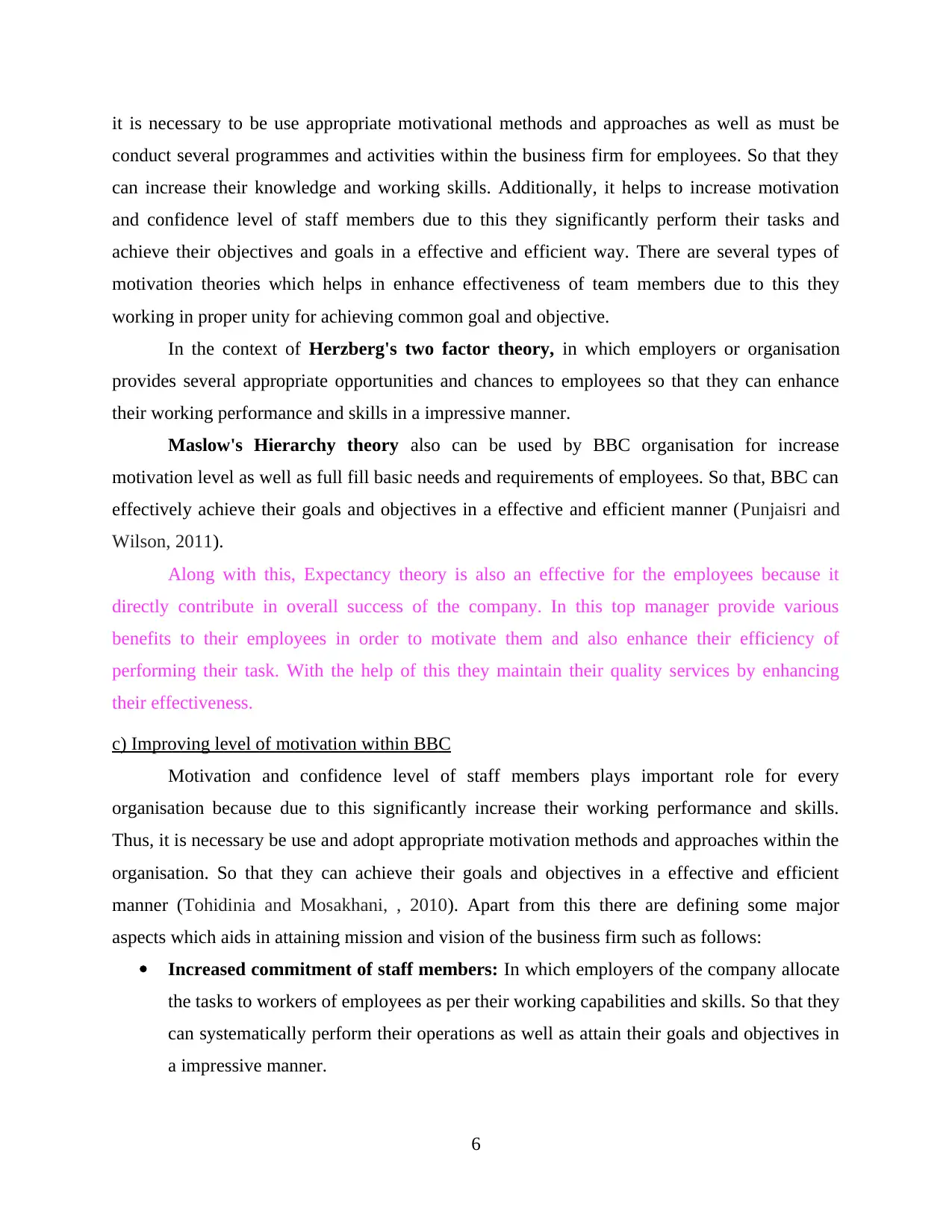
it is necessary to be use appropriate motivational methods and approaches as well as must be
conduct several programmes and activities within the business firm for employees. So that they
can increase their knowledge and working skills. Additionally, it helps to increase motivation
and confidence level of staff members due to this they significantly perform their tasks and
achieve their objectives and goals in a effective and efficient way. There are several types of
motivation theories which helps in enhance effectiveness of team members due to this they
working in proper unity for achieving common goal and objective.
In the context of Herzberg's two factor theory, in which employers or organisation
provides several appropriate opportunities and chances to employees so that they can enhance
their working performance and skills in a impressive manner.
Maslow's Hierarchy theory also can be used by BBC organisation for increase
motivation level as well as full fill basic needs and requirements of employees. So that, BBC can
effectively achieve their goals and objectives in a effective and efficient manner (Punjaisri and
Wilson, 2011).
Along with this, Expectancy theory is also an effective for the employees because it
directly contribute in overall success of the company. In this top manager provide various
benefits to their employees in order to motivate them and also enhance their efficiency of
performing their task. With the help of this they maintain their quality services by enhancing
their effectiveness.
c) Improving level of motivation within BBC
Motivation and confidence level of staff members plays important role for every
organisation because due to this significantly increase their working performance and skills.
Thus, it is necessary be use and adopt appropriate motivation methods and approaches within the
organisation. So that they can achieve their goals and objectives in a effective and efficient
manner (Tohidinia and Mosakhani, , 2010). Apart from this there are defining some major
aspects which aids in attaining mission and vision of the business firm such as follows:
Increased commitment of staff members: In which employers of the company allocate
the tasks to workers of employees as per their working capabilities and skills. So that they
can systematically perform their operations as well as attain their goals and objectives in
a impressive manner.
6
conduct several programmes and activities within the business firm for employees. So that they
can increase their knowledge and working skills. Additionally, it helps to increase motivation
and confidence level of staff members due to this they significantly perform their tasks and
achieve their objectives and goals in a effective and efficient way. There are several types of
motivation theories which helps in enhance effectiveness of team members due to this they
working in proper unity for achieving common goal and objective.
In the context of Herzberg's two factor theory, in which employers or organisation
provides several appropriate opportunities and chances to employees so that they can enhance
their working performance and skills in a impressive manner.
Maslow's Hierarchy theory also can be used by BBC organisation for increase
motivation level as well as full fill basic needs and requirements of employees. So that, BBC can
effectively achieve their goals and objectives in a effective and efficient manner (Punjaisri and
Wilson, 2011).
Along with this, Expectancy theory is also an effective for the employees because it
directly contribute in overall success of the company. In this top manager provide various
benefits to their employees in order to motivate them and also enhance their efficiency of
performing their task. With the help of this they maintain their quality services by enhancing
their effectiveness.
c) Improving level of motivation within BBC
Motivation and confidence level of staff members plays important role for every
organisation because due to this significantly increase their working performance and skills.
Thus, it is necessary be use and adopt appropriate motivation methods and approaches within the
organisation. So that they can achieve their goals and objectives in a effective and efficient
manner (Tohidinia and Mosakhani, , 2010). Apart from this there are defining some major
aspects which aids in attaining mission and vision of the business firm such as follows:
Increased commitment of staff members: In which employers of the company allocate
the tasks to workers of employees as per their working capabilities and skills. So that they
can systematically perform their operations as well as attain their goals and objectives in
a impressive manner.
6
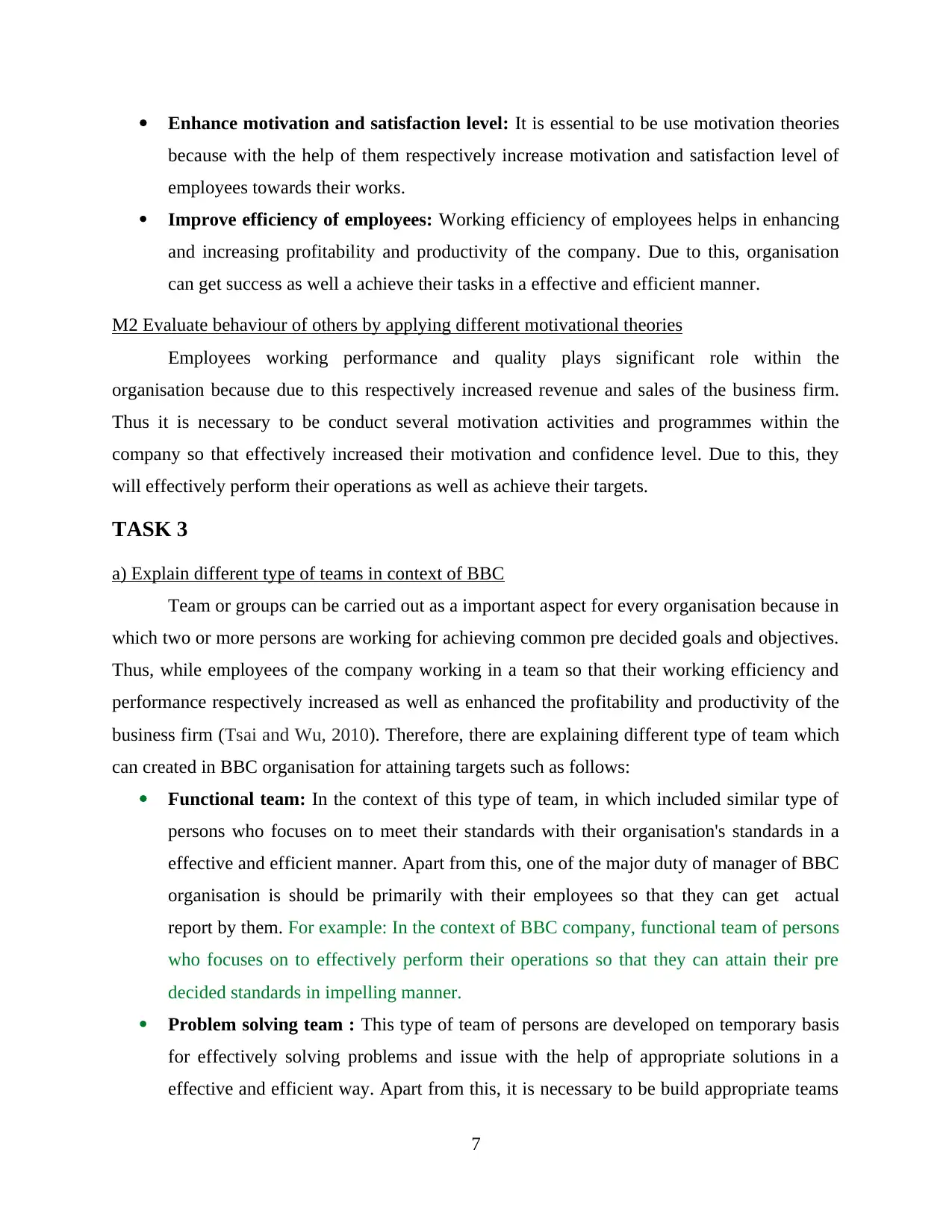
Enhance motivation and satisfaction level: It is essential to be use motivation theories
because with the help of them respectively increase motivation and satisfaction level of
employees towards their works.
Improve efficiency of employees: Working efficiency of employees helps in enhancing
and increasing profitability and productivity of the company. Due to this, organisation
can get success as well a achieve their tasks in a effective and efficient manner.
M2 Evaluate behaviour of others by applying different motivational theories
Employees working performance and quality plays significant role within the
organisation because due to this respectively increased revenue and sales of the business firm.
Thus it is necessary to be conduct several motivation activities and programmes within the
company so that effectively increased their motivation and confidence level. Due to this, they
will effectively perform their operations as well as achieve their targets.
TASK 3
a) Explain different type of teams in context of BBC
Team or groups can be carried out as a important aspect for every organisation because in
which two or more persons are working for achieving common pre decided goals and objectives.
Thus, while employees of the company working in a team so that their working efficiency and
performance respectively increased as well as enhanced the profitability and productivity of the
business firm (Tsai and Wu, 2010). Therefore, there are explaining different type of team which
can created in BBC organisation for attaining targets such as follows:
Functional team: In the context of this type of team, in which included similar type of
persons who focuses on to meet their standards with their organisation's standards in a
effective and efficient manner. Apart from this, one of the major duty of manager of BBC
organisation is should be primarily with their employees so that they can get actual
report by them. For example: In the context of BBC company, functional team of persons
who focuses on to effectively perform their operations so that they can attain their pre
decided standards in impelling manner.
Problem solving team : This type of team of persons are developed on temporary basis
for effectively solving problems and issue with the help of appropriate solutions in a
effective and efficient way. Apart from this, it is necessary to be build appropriate teams
7
because with the help of them respectively increase motivation and satisfaction level of
employees towards their works.
Improve efficiency of employees: Working efficiency of employees helps in enhancing
and increasing profitability and productivity of the company. Due to this, organisation
can get success as well a achieve their tasks in a effective and efficient manner.
M2 Evaluate behaviour of others by applying different motivational theories
Employees working performance and quality plays significant role within the
organisation because due to this respectively increased revenue and sales of the business firm.
Thus it is necessary to be conduct several motivation activities and programmes within the
company so that effectively increased their motivation and confidence level. Due to this, they
will effectively perform their operations as well as achieve their targets.
TASK 3
a) Explain different type of teams in context of BBC
Team or groups can be carried out as a important aspect for every organisation because in
which two or more persons are working for achieving common pre decided goals and objectives.
Thus, while employees of the company working in a team so that their working efficiency and
performance respectively increased as well as enhanced the profitability and productivity of the
business firm (Tsai and Wu, 2010). Therefore, there are explaining different type of team which
can created in BBC organisation for attaining targets such as follows:
Functional team: In the context of this type of team, in which included similar type of
persons who focuses on to meet their standards with their organisation's standards in a
effective and efficient manner. Apart from this, one of the major duty of manager of BBC
organisation is should be primarily with their employees so that they can get actual
report by them. For example: In the context of BBC company, functional team of persons
who focuses on to effectively perform their operations so that they can attain their pre
decided standards in impelling manner.
Problem solving team : This type of team of persons are developed on temporary basis
for effectively solving problems and issue with the help of appropriate solutions in a
effective and efficient way. Apart from this, it is necessary to be build appropriate teams
7
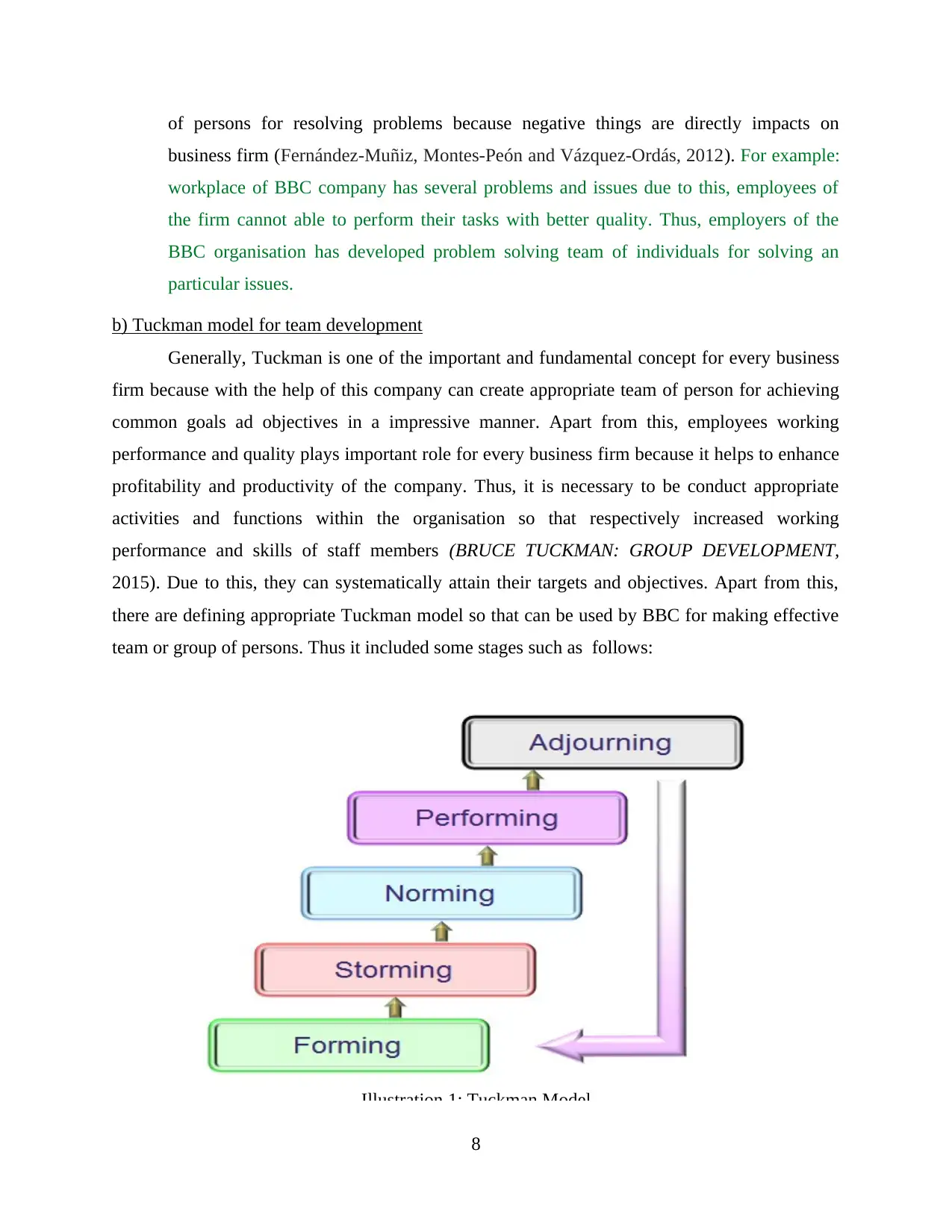
of persons for resolving problems because negative things are directly impacts on
business firm (Fernández-Muñiz, Montes-Peón and Vázquez-Ordás, 2012). For example:
workplace of BBC company has several problems and issues due to this, employees of
the firm cannot able to perform their tasks with better quality. Thus, employers of the
BBC organisation has developed problem solving team of individuals for solving an
particular issues.
b) Tuckman model for team development
Generally, Tuckman is one of the important and fundamental concept for every business
firm because with the help of this company can create appropriate team of person for achieving
common goals ad objectives in a impressive manner. Apart from this, employees working
performance and quality plays important role for every business firm because it helps to enhance
profitability and productivity of the company. Thus, it is necessary to be conduct appropriate
activities and functions within the organisation so that respectively increased working
performance and skills of staff members (BRUCE TUCKMAN: GROUP DEVELOPMENT,
2015). Due to this, they can systematically attain their targets and objectives. Apart from this,
there are defining appropriate Tuckman model so that can be used by BBC for making effective
team or group of persons. Thus it included some stages such as follows:
Illustration 1: Tuckman Model
8
business firm (Fernández-Muñiz, Montes-Peón and Vázquez-Ordás, 2012). For example:
workplace of BBC company has several problems and issues due to this, employees of
the firm cannot able to perform their tasks with better quality. Thus, employers of the
BBC organisation has developed problem solving team of individuals for solving an
particular issues.
b) Tuckman model for team development
Generally, Tuckman is one of the important and fundamental concept for every business
firm because with the help of this company can create appropriate team of person for achieving
common goals ad objectives in a impressive manner. Apart from this, employees working
performance and quality plays important role for every business firm because it helps to enhance
profitability and productivity of the company. Thus, it is necessary to be conduct appropriate
activities and functions within the organisation so that respectively increased working
performance and skills of staff members (BRUCE TUCKMAN: GROUP DEVELOPMENT,
2015). Due to this, they can systematically attain their targets and objectives. Apart from this,
there are defining appropriate Tuckman model so that can be used by BBC for making effective
team or group of persons. Thus it included some stages such as follows:
Illustration 1: Tuckman Model
8
Secure Best Marks with AI Grader
Need help grading? Try our AI Grader for instant feedback on your assignments.
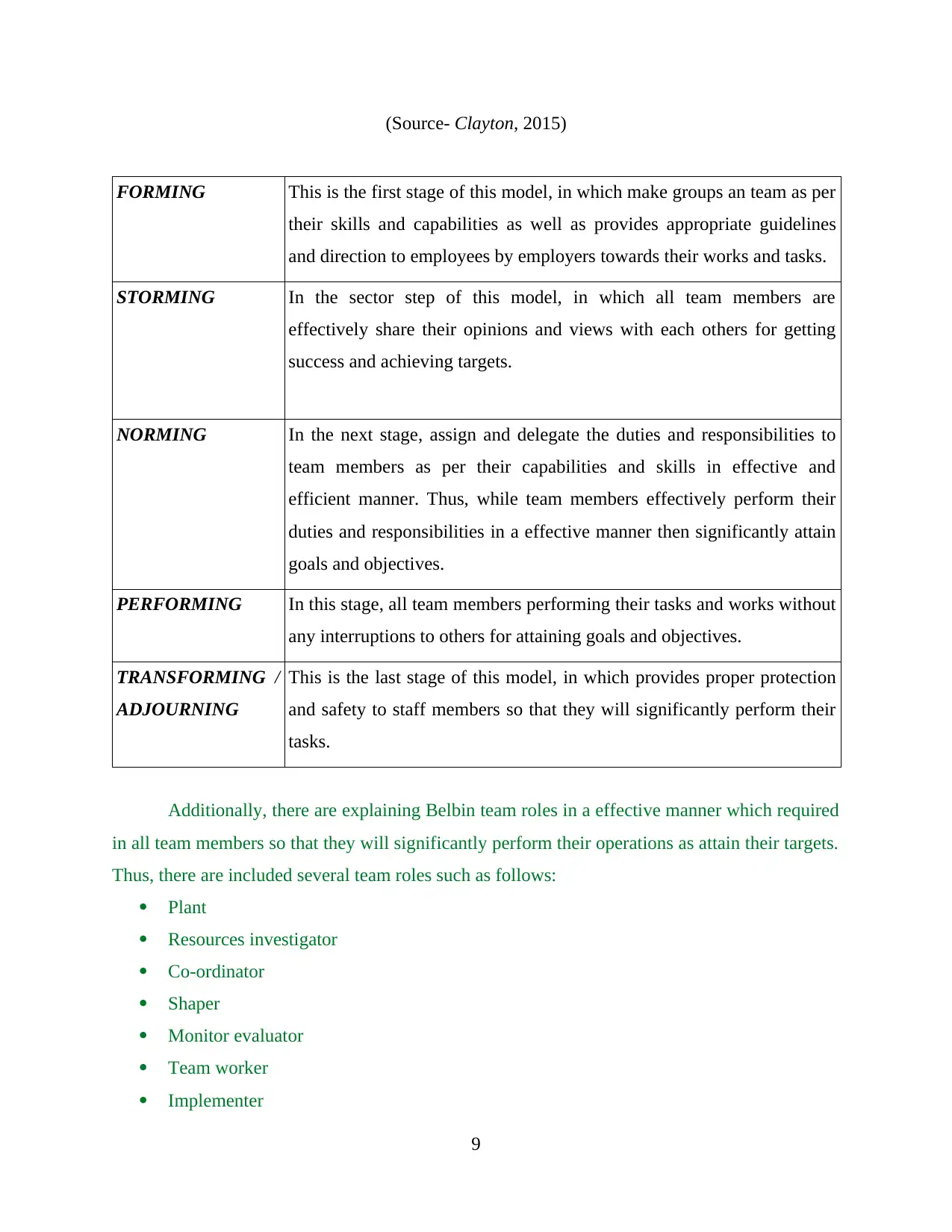
(Source- Clayton, 2015)
FORMING This is the first stage of this model, in which make groups an team as per
their skills and capabilities as well as provides appropriate guidelines
and direction to employees by employers towards their works and tasks.
STORMING In the sector step of this model, in which all team members are
effectively share their opinions and views with each others for getting
success and achieving targets.
NORMING In the next stage, assign and delegate the duties and responsibilities to
team members as per their capabilities and skills in effective and
efficient manner. Thus, while team members effectively perform their
duties and responsibilities in a effective manner then significantly attain
goals and objectives.
PERFORMING In this stage, all team members performing their tasks and works without
any interruptions to others for attaining goals and objectives.
TRANSFORMING /
ADJOURNING
This is the last stage of this model, in which provides proper protection
and safety to staff members so that they will significantly perform their
tasks.
Additionally, there are explaining Belbin team roles in a effective manner which required
in all team members so that they will significantly perform their operations as attain their targets.
Thus, there are included several team roles such as follows:
Plant
Resources investigator
Co-ordinator
Shaper
Monitor evaluator
Team worker
Implementer
9
FORMING This is the first stage of this model, in which make groups an team as per
their skills and capabilities as well as provides appropriate guidelines
and direction to employees by employers towards their works and tasks.
STORMING In the sector step of this model, in which all team members are
effectively share their opinions and views with each others for getting
success and achieving targets.
NORMING In the next stage, assign and delegate the duties and responsibilities to
team members as per their capabilities and skills in effective and
efficient manner. Thus, while team members effectively perform their
duties and responsibilities in a effective manner then significantly attain
goals and objectives.
PERFORMING In this stage, all team members performing their tasks and works without
any interruptions to others for attaining goals and objectives.
TRANSFORMING /
ADJOURNING
This is the last stage of this model, in which provides proper protection
and safety to staff members so that they will significantly perform their
tasks.
Additionally, there are explaining Belbin team roles in a effective manner which required
in all team members so that they will significantly perform their operations as attain their targets.
Thus, there are included several team roles such as follows:
Plant
Resources investigator
Co-ordinator
Shaper
Monitor evaluator
Team worker
Implementer
9
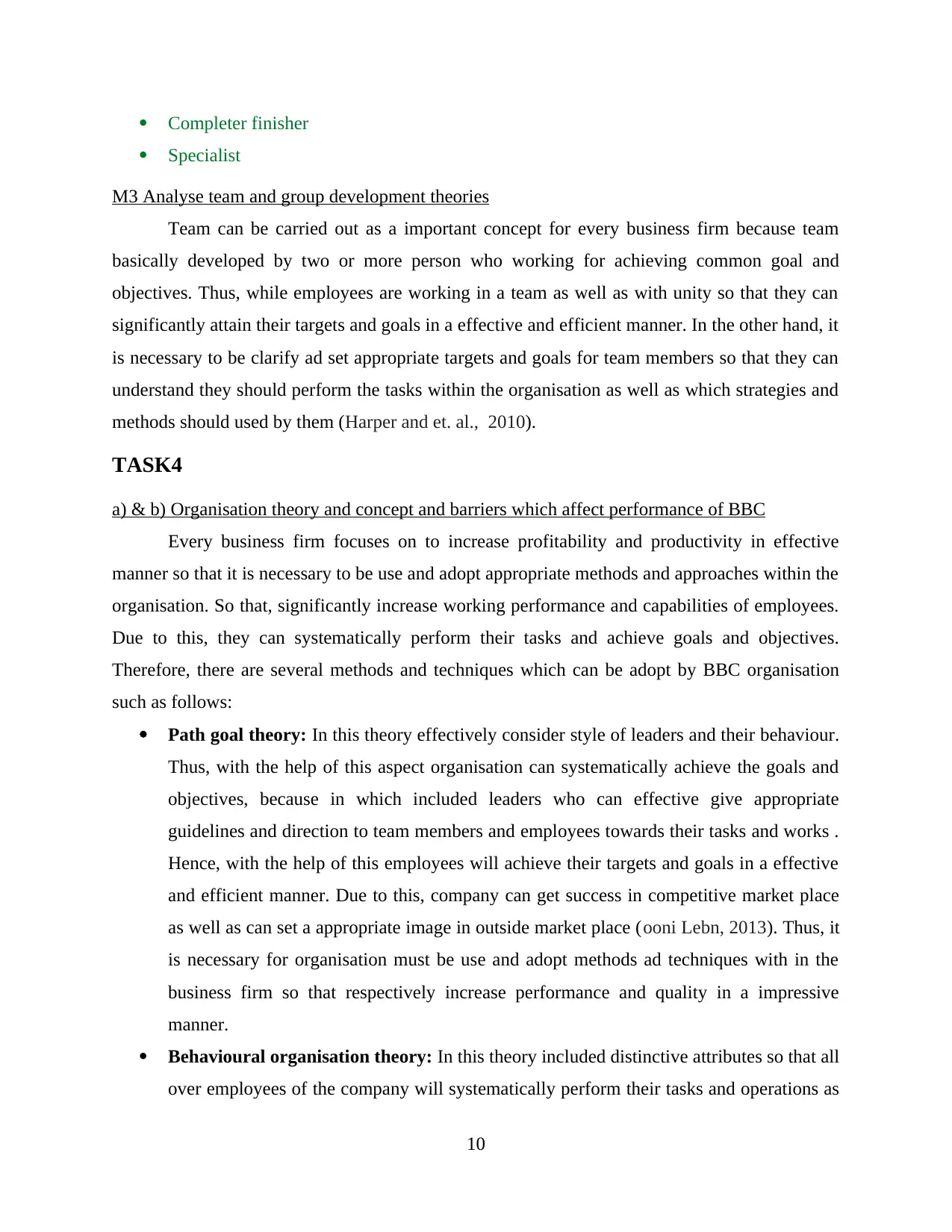
Completer finisher
Specialist
M3 Analyse team and group development theories
Team can be carried out as a important concept for every business firm because team
basically developed by two or more person who working for achieving common goal and
objectives. Thus, while employees are working in a team as well as with unity so that they can
significantly attain their targets and goals in a effective and efficient manner. In the other hand, it
is necessary to be clarify ad set appropriate targets and goals for team members so that they can
understand they should perform the tasks within the organisation as well as which strategies and
methods should used by them (Harper and et. al., 2010).
TASK4
a) & b) Organisation theory and concept and barriers which affect performance of BBC
Every business firm focuses on to increase profitability and productivity in effective
manner so that it is necessary to be use and adopt appropriate methods and approaches within the
organisation. So that, significantly increase working performance and capabilities of employees.
Due to this, they can systematically perform their tasks and achieve goals and objectives.
Therefore, there are several methods and techniques which can be adopt by BBC organisation
such as follows:
Path goal theory: In this theory effectively consider style of leaders and their behaviour.
Thus, with the help of this aspect organisation can systematically achieve the goals and
objectives, because in which included leaders who can effective give appropriate
guidelines and direction to team members and employees towards their tasks and works .
Hence, with the help of this employees will achieve their targets and goals in a effective
and efficient manner. Due to this, company can get success in competitive market place
as well as can set a appropriate image in outside market place (ooni Lebn, 2013). Thus, it
is necessary for organisation must be use and adopt methods ad techniques with in the
business firm so that respectively increase performance and quality in a impressive
manner.
Behavioural organisation theory: In this theory included distinctive attributes so that all
over employees of the company will systematically perform their tasks and operations as
10
Specialist
M3 Analyse team and group development theories
Team can be carried out as a important concept for every business firm because team
basically developed by two or more person who working for achieving common goal and
objectives. Thus, while employees are working in a team as well as with unity so that they can
significantly attain their targets and goals in a effective and efficient manner. In the other hand, it
is necessary to be clarify ad set appropriate targets and goals for team members so that they can
understand they should perform the tasks within the organisation as well as which strategies and
methods should used by them (Harper and et. al., 2010).
TASK4
a) & b) Organisation theory and concept and barriers which affect performance of BBC
Every business firm focuses on to increase profitability and productivity in effective
manner so that it is necessary to be use and adopt appropriate methods and approaches within the
organisation. So that, significantly increase working performance and capabilities of employees.
Due to this, they can systematically perform their tasks and achieve goals and objectives.
Therefore, there are several methods and techniques which can be adopt by BBC organisation
such as follows:
Path goal theory: In this theory effectively consider style of leaders and their behaviour.
Thus, with the help of this aspect organisation can systematically achieve the goals and
objectives, because in which included leaders who can effective give appropriate
guidelines and direction to team members and employees towards their tasks and works .
Hence, with the help of this employees will achieve their targets and goals in a effective
and efficient manner. Due to this, company can get success in competitive market place
as well as can set a appropriate image in outside market place (ooni Lebn, 2013). Thus, it
is necessary for organisation must be use and adopt methods ad techniques with in the
business firm so that respectively increase performance and quality in a impressive
manner.
Behavioural organisation theory: In this theory included distinctive attributes so that all
over employees of the company will systematically perform their tasks and operations as
10
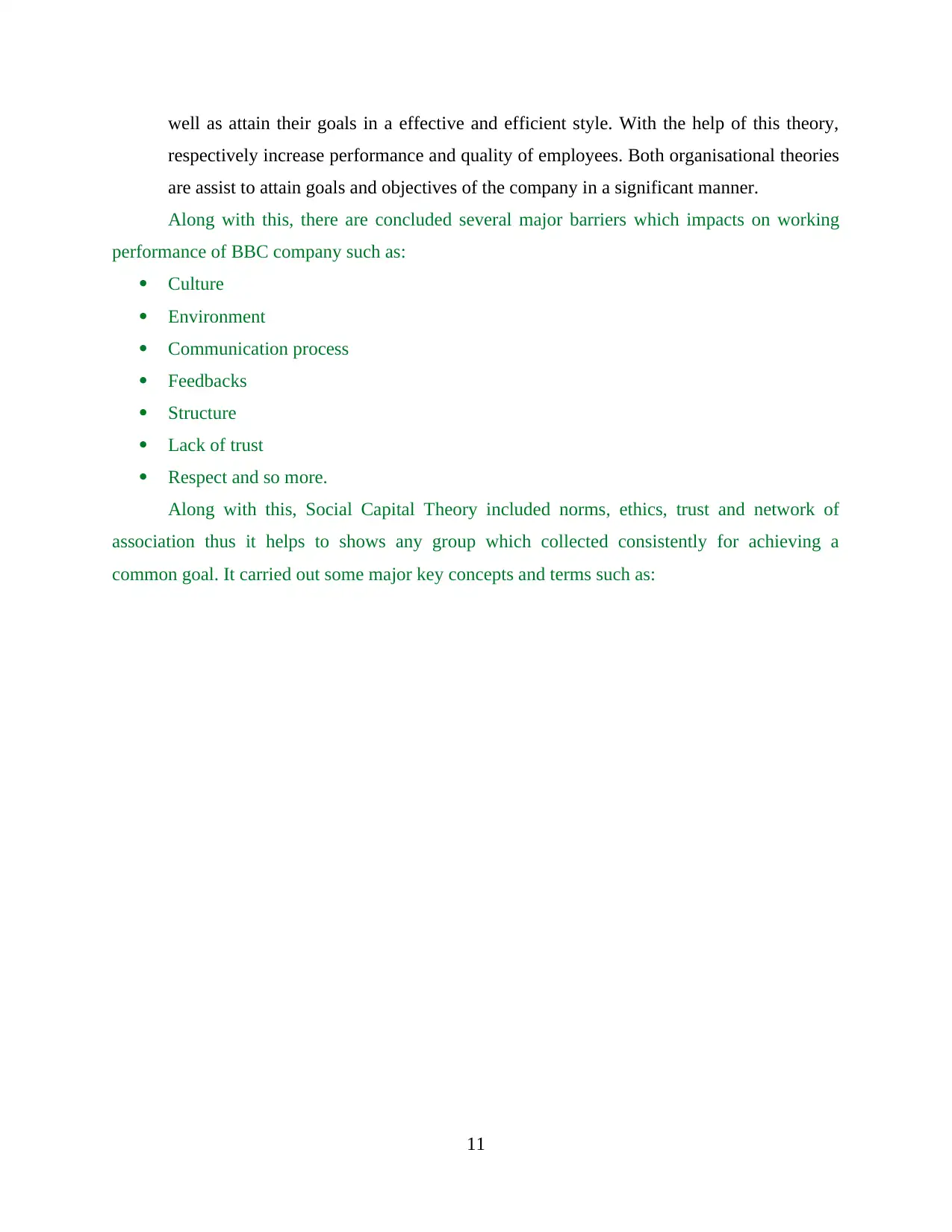
well as attain their goals in a effective and efficient style. With the help of this theory,
respectively increase performance and quality of employees. Both organisational theories
are assist to attain goals and objectives of the company in a significant manner.
Along with this, there are concluded several major barriers which impacts on working
performance of BBC company such as:
Culture
Environment
Communication process
Feedbacks
Structure
Lack of trust
Respect and so more.
Along with this, Social Capital Theory included norms, ethics, trust and network of
association thus it helps to shows any group which collected consistently for achieving a
common goal. It carried out some major key concepts and terms such as:
11
respectively increase performance and quality of employees. Both organisational theories
are assist to attain goals and objectives of the company in a significant manner.
Along with this, there are concluded several major barriers which impacts on working
performance of BBC company such as:
Culture
Environment
Communication process
Feedbacks
Structure
Lack of trust
Respect and so more.
Along with this, Social Capital Theory included norms, ethics, trust and network of
association thus it helps to shows any group which collected consistently for achieving a
common goal. It carried out some major key concepts and terms such as:
11
Paraphrase This Document
Need a fresh take? Get an instant paraphrase of this document with our AI Paraphraser
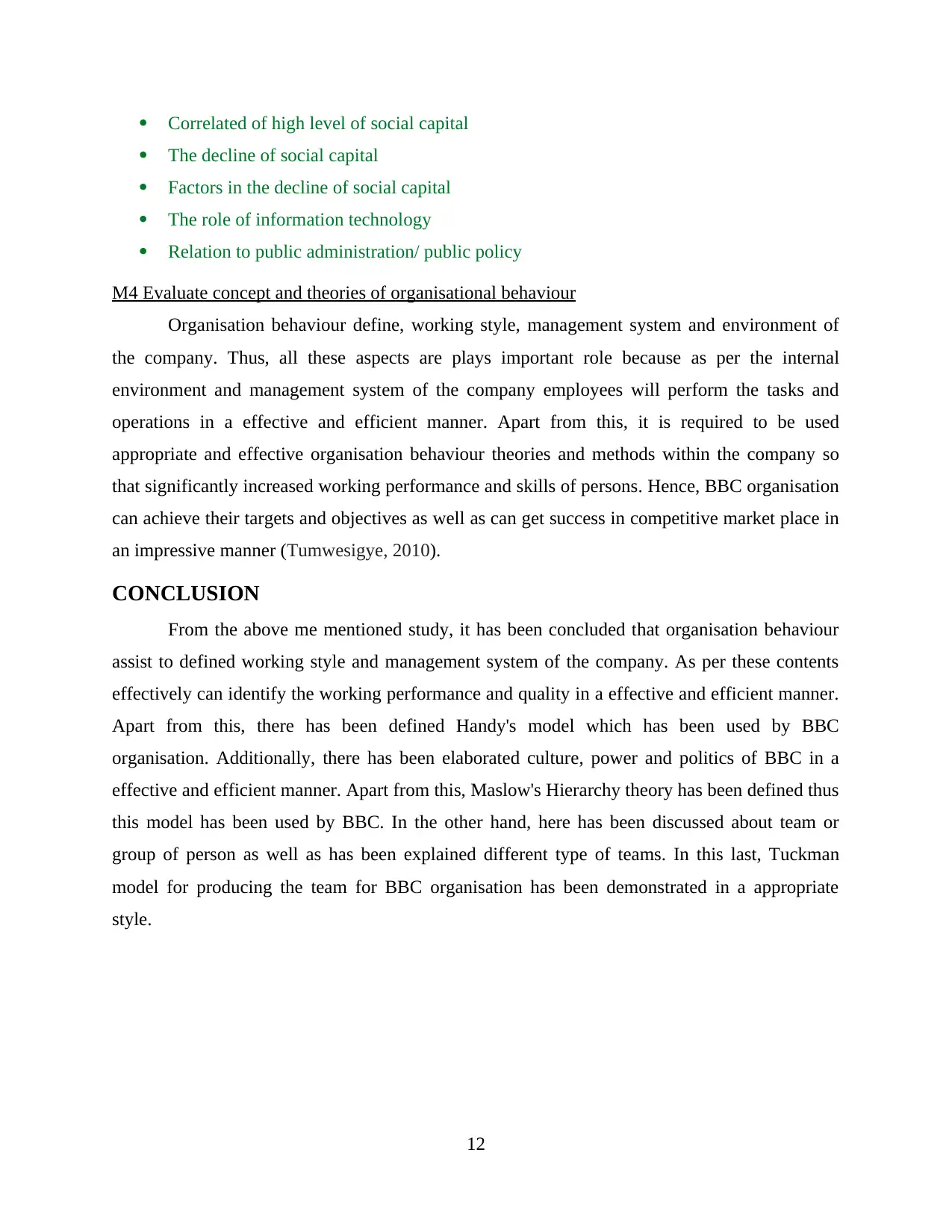
Correlated of high level of social capital
The decline of social capital
Factors in the decline of social capital
The role of information technology
Relation to public administration/ public policy
M4 Evaluate concept and theories of organisational behaviour
Organisation behaviour define, working style, management system and environment of
the company. Thus, all these aspects are plays important role because as per the internal
environment and management system of the company employees will perform the tasks and
operations in a effective and efficient manner. Apart from this, it is required to be used
appropriate and effective organisation behaviour theories and methods within the company so
that significantly increased working performance and skills of persons. Hence, BBC organisation
can achieve their targets and objectives as well as can get success in competitive market place in
an impressive manner (Tumwesigye, 2010).
CONCLUSION
From the above me mentioned study, it has been concluded that organisation behaviour
assist to defined working style and management system of the company. As per these contents
effectively can identify the working performance and quality in a effective and efficient manner.
Apart from this, there has been defined Handy's model which has been used by BBC
organisation. Additionally, there has been elaborated culture, power and politics of BBC in a
effective and efficient manner. Apart from this, Maslow's Hierarchy theory has been defined thus
this model has been used by BBC. In the other hand, here has been discussed about team or
group of person as well as has been explained different type of teams. In this last, Tuckman
model for producing the team for BBC organisation has been demonstrated in a appropriate
style.
12
The decline of social capital
Factors in the decline of social capital
The role of information technology
Relation to public administration/ public policy
M4 Evaluate concept and theories of organisational behaviour
Organisation behaviour define, working style, management system and environment of
the company. Thus, all these aspects are plays important role because as per the internal
environment and management system of the company employees will perform the tasks and
operations in a effective and efficient manner. Apart from this, it is required to be used
appropriate and effective organisation behaviour theories and methods within the company so
that significantly increased working performance and skills of persons. Hence, BBC organisation
can achieve their targets and objectives as well as can get success in competitive market place in
an impressive manner (Tumwesigye, 2010).
CONCLUSION
From the above me mentioned study, it has been concluded that organisation behaviour
assist to defined working style and management system of the company. As per these contents
effectively can identify the working performance and quality in a effective and efficient manner.
Apart from this, there has been defined Handy's model which has been used by BBC
organisation. Additionally, there has been elaborated culture, power and politics of BBC in a
effective and efficient manner. Apart from this, Maslow's Hierarchy theory has been defined thus
this model has been used by BBC. In the other hand, here has been discussed about team or
group of person as well as has been explained different type of teams. In this last, Tuckman
model for producing the team for BBC organisation has been demonstrated in a appropriate
style.
12
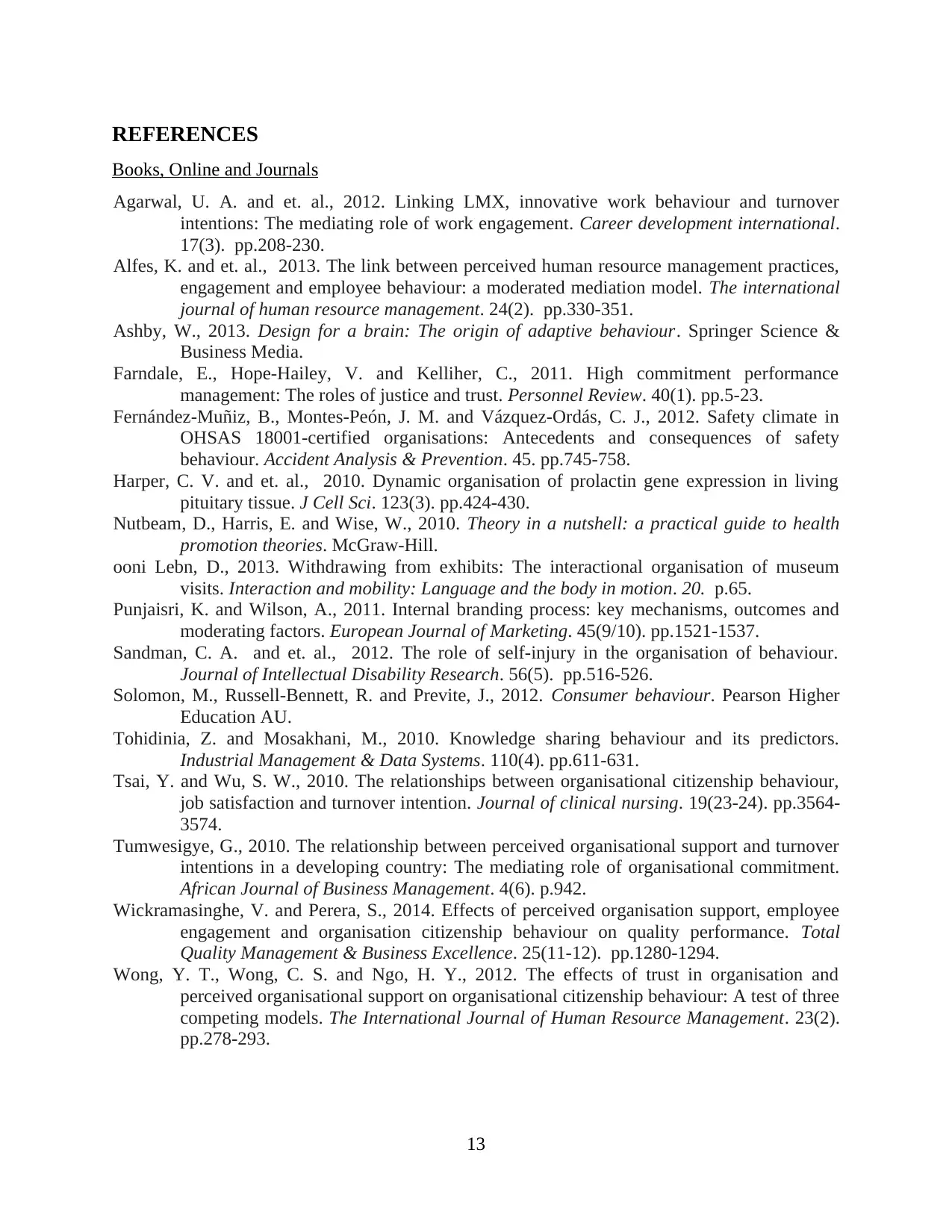
REFERENCES
Books, Online and Journals
Agarwal, U. A. and et. al., 2012. Linking LMX, innovative work behaviour and turnover
intentions: The mediating role of work engagement. Career development international.
17(3). pp.208-230.
Alfes, K. and et. al., 2013. The link between perceived human resource management practices,
engagement and employee behaviour: a moderated mediation model. The international
journal of human resource management. 24(2). pp.330-351.
Ashby, W., 2013. Design for a brain: The origin of adaptive behaviour. Springer Science &
Business Media.
Farndale, E., Hope-Hailey, V. and Kelliher, C., 2011. High commitment performance
management: The roles of justice and trust. Personnel Review. 40(1). pp.5-23.
Fernández-Muñiz, B., Montes-Peón, J. M. and Vázquez-Ordás, C. J., 2012. Safety climate in
OHSAS 18001-certified organisations: Antecedents and consequences of safety
behaviour. Accident Analysis & Prevention. 45. pp.745-758.
Harper, C. V. and et. al., 2010. Dynamic organisation of prolactin gene expression in living
pituitary tissue. J Cell Sci. 123(3). pp.424-430.
Nutbeam, D., Harris, E. and Wise, W., 2010. Theory in a nutshell: a practical guide to health
promotion theories. McGraw-Hill.
ooni Lebn, D., 2013. Withdrawing from exhibits: The interactional organisation of museum
visits. Interaction and mobility: Language and the body in motion. 20. p.65.
Punjaisri, K. and Wilson, A., 2011. Internal branding process: key mechanisms, outcomes and
moderating factors. European Journal of Marketing. 45(9/10). pp.1521-1537.
Sandman, C. A. and et. al., 2012. The role of self‐injury in the organisation of behaviour.
Journal of Intellectual Disability Research. 56(5). pp.516-526.
Solomon, M., Russell-Bennett, R. and Previte, J., 2012. Consumer behaviour. Pearson Higher
Education AU.
Tohidinia, Z. and Mosakhani, M., 2010. Knowledge sharing behaviour and its predictors.
Industrial Management & Data Systems. 110(4). pp.611-631.
Tsai, Y. and Wu, S. W., 2010. The relationships between organisational citizenship behaviour,
job satisfaction and turnover intention. Journal of clinical nursing. 19(23‐24). pp.3564-
3574.
Tumwesigye, G., 2010. The relationship between perceived organisational support and turnover
intentions in a developing country: The mediating role of organisational commitment.
African Journal of Business Management. 4(6). p.942.
Wickramasinghe, V. and Perera, S., 2014. Effects of perceived organisation support, employee
engagement and organisation citizenship behaviour on quality performance. Total
Quality Management & Business Excellence. 25(11-12). pp.1280-1294.
Wong, Y. T., Wong, C. S. and Ngo, H. Y., 2012. The effects of trust in organisation and
perceived organisational support on organisational citizenship behaviour: A test of three
competing models. The International Journal of Human Resource Management. 23(2).
pp.278-293.
13
Books, Online and Journals
Agarwal, U. A. and et. al., 2012. Linking LMX, innovative work behaviour and turnover
intentions: The mediating role of work engagement. Career development international.
17(3). pp.208-230.
Alfes, K. and et. al., 2013. The link between perceived human resource management practices,
engagement and employee behaviour: a moderated mediation model. The international
journal of human resource management. 24(2). pp.330-351.
Ashby, W., 2013. Design for a brain: The origin of adaptive behaviour. Springer Science &
Business Media.
Farndale, E., Hope-Hailey, V. and Kelliher, C., 2011. High commitment performance
management: The roles of justice and trust. Personnel Review. 40(1). pp.5-23.
Fernández-Muñiz, B., Montes-Peón, J. M. and Vázquez-Ordás, C. J., 2012. Safety climate in
OHSAS 18001-certified organisations: Antecedents and consequences of safety
behaviour. Accident Analysis & Prevention. 45. pp.745-758.
Harper, C. V. and et. al., 2010. Dynamic organisation of prolactin gene expression in living
pituitary tissue. J Cell Sci. 123(3). pp.424-430.
Nutbeam, D., Harris, E. and Wise, W., 2010. Theory in a nutshell: a practical guide to health
promotion theories. McGraw-Hill.
ooni Lebn, D., 2013. Withdrawing from exhibits: The interactional organisation of museum
visits. Interaction and mobility: Language and the body in motion. 20. p.65.
Punjaisri, K. and Wilson, A., 2011. Internal branding process: key mechanisms, outcomes and
moderating factors. European Journal of Marketing. 45(9/10). pp.1521-1537.
Sandman, C. A. and et. al., 2012. The role of self‐injury in the organisation of behaviour.
Journal of Intellectual Disability Research. 56(5). pp.516-526.
Solomon, M., Russell-Bennett, R. and Previte, J., 2012. Consumer behaviour. Pearson Higher
Education AU.
Tohidinia, Z. and Mosakhani, M., 2010. Knowledge sharing behaviour and its predictors.
Industrial Management & Data Systems. 110(4). pp.611-631.
Tsai, Y. and Wu, S. W., 2010. The relationships between organisational citizenship behaviour,
job satisfaction and turnover intention. Journal of clinical nursing. 19(23‐24). pp.3564-
3574.
Tumwesigye, G., 2010. The relationship between perceived organisational support and turnover
intentions in a developing country: The mediating role of organisational commitment.
African Journal of Business Management. 4(6). p.942.
Wickramasinghe, V. and Perera, S., 2014. Effects of perceived organisation support, employee
engagement and organisation citizenship behaviour on quality performance. Total
Quality Management & Business Excellence. 25(11-12). pp.1280-1294.
Wong, Y. T., Wong, C. S. and Ngo, H. Y., 2012. The effects of trust in organisation and
perceived organisational support on organisational citizenship behaviour: A test of three
competing models. The International Journal of Human Resource Management. 23(2).
pp.278-293.
13
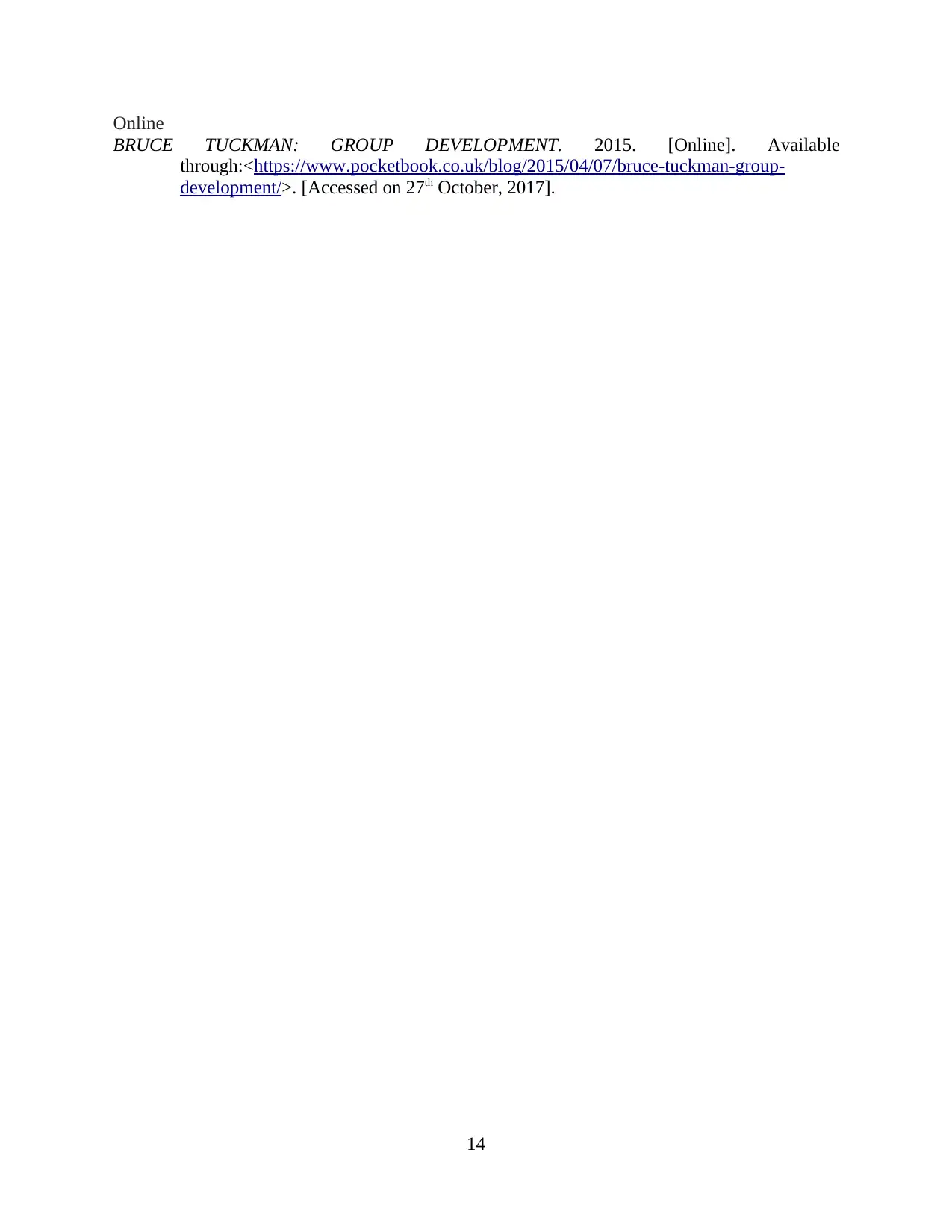
Online
BRUCE TUCKMAN: GROUP DEVELOPMENT. 2015. [Online]. Available
through:<https://www.pocketbook.co.uk/blog/2015/04/07/bruce-tuckman-group-
development/>. [Accessed on 27th October, 2017].
14
BRUCE TUCKMAN: GROUP DEVELOPMENT. 2015. [Online]. Available
through:<https://www.pocketbook.co.uk/blog/2015/04/07/bruce-tuckman-group-
development/>. [Accessed on 27th October, 2017].
14
1 out of 16
Related Documents
Your All-in-One AI-Powered Toolkit for Academic Success.
+13062052269
info@desklib.com
Available 24*7 on WhatsApp / Email
![[object Object]](/_next/static/media/star-bottom.7253800d.svg)
Unlock your academic potential
© 2024 | Zucol Services PVT LTD | All rights reserved.





